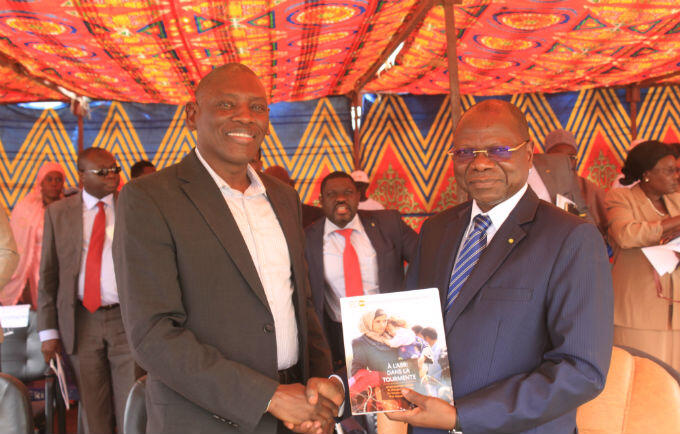Sido, Chad, 3 December 2015. The Republic of Chad hosted on December 3, 2015, the regional launch of the 2015 State of World Population Report at Sido, in the Moyen-Chari Region and at the border with the Central African Republic. This year’s report entitled: “Shelter from the Storm” focuses on the need for increased humanitarian intervention resources and sustainable development to address the heightened vulnerabilities and risks faced by women and girls in situations of conflicts and humanitarian crisis.
The choice of the country of Toumaï to celebrate this important event this year is a testimony of Chad's commitment to securing stability in the sub region, and to contributing to sustainable solution to the influx of refugees and returnees to the country.
Organized by UNFPA, the United Nations Population Fund, and the Chadian government the regional launching ceremony was held in the Sido Refugee Site. This is currently home to 102,892 Central African refugees and 130,000 Chadian returnees, all of whom are victims of the prevailing humanitarian, political and military crisis.
The launch of the SWOP 2015 spearheaded by Mr. Mabingue Ngom, UNFPA Regional Director for West and Central Africa, was attended by H.E Kalzeubet Pahimi Deubet, Prime Minister of Chad, and six members of the Government; Mr. Stephen Tull Humanitarian Coordinator Resident of the United Nations in Chad; the diplomatic corps; the representatives of UN agencies and international organizations, dozens of heads of the Central administration and Regional and Local Authorities.
The populations of the cities of Sarh, Maro, Maïgama, Sido and especially refugees and returnees massively turned out at the site and fervently welcomed the delegations.
Several speeches marked this launch event including the welcome speech from Governor of Moyen Chari, the speech of the Resident Coordinator of UN System in Chad and the launch of the report Speech by Mr. Ngom and the Prime Minister's closing Speech.
Mr. Ngom pointed out that, "Our 2015 report invites us to have a critical look at the humanitarian assistance we provide to the affected population, especially women, youth and children who are visibly most vulnerable and those who pay the heaviest price.”
He also added that: “It is now time to move beyond providing shelter and food for displaced persons to ensuring access to services, resilience, protection, opportunities and empowerment especially for women and adolescents. Only by connecting humanitarian intervention with equitable development will sustainable development be realized.”
In his closing speech, the Chadian Prime Minister taking stock of the humanitarian situation in the country to date, said that "3.9 million people in Chad are affected by crises. More than half of them, of which 2.3 million or 51% are women who need assistance. 550,000 people (refugees, returnees and internally displaced persons), half of which are women and children under 18 are directly affected by population movements following the conflicts in neighboring countries (Sudan, CAR, Nigeria) and live in camps, host websites or in host communities".
The Prime Minister took the opportunity to thank all partners for their tireless efforts to support Chad in caring of these vulnerable people especially UNFPA staff for their assistance and efforts.
The Regional Director then presented the Report on the State of World Population 2015 to the Chadian Prime Minister to close the ceremony followed by the visit of the health center built by UNFPA at the site of the returnees (Block 2). It was an opportunity for the delegation to experience firsthand the sexual and reproductive health services being offered.
In West and Central Africa, there are more than 2 million IDPs in 11 countries: Cameroon (438,500), Central Africa Republic (438,500), Chad (71 000), Republic of Congo (7, 800), Côte d’Ivoire (300,900), Liberia (23,000), Mali (61,600), Niger (11,000), Nigeria (1,075,300), Senegal (24 000) and Togo (10,000).
Humanitarian crisis and conflict - forced migration, Ebola outbreak, violent extremism, food insecurity, climate change as well as social, health and economic shocks - is prevalent in the West and Central Africa region and this is significantly affecting the wellbeing of people especially women and adolescents, the stability of countries and the state of economies.
In 2015, in addition to Chad, UNFPA has provided humanitarian support focusing on access to services to Burkina Faso, Cameroon, Central Africa Republic, Mali, Mauritania, Niger, Nigeria and Senegal in order to protect the lives and health of both mothers and babies.




